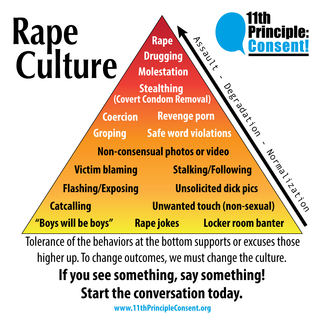By Claire Dugan  I’m sure we have all noticed the issue of consent blowing up our headlines these days. Even before the recent Weinstein, Spacey, Louie CK, Roy Moore, Charlie Rose, and Al Franken scandals, the issue has been gaining traction for a long time. As I grew up, I learned about rape, I learned about cat-calling, I adhered to the dress code that my school imposed on girls, saw depictions of prostitutes on TV, fantasized about bondage, was fascinated by what might make me attractive to boys, and accepted the simple fact that my actions – conscious or not -- determined boys behavior. These were all separate issues for my friends and me, all part of a wide-flung web of adult knowledge that we were desperate to grasp. As part of a mindful millennial generation, we are starting to make sense of this web, tying each type of incident to the next to form an outline of respectful consent. So let’s break it down; consent is simply making sure you’re on the same page as every other party involved in your actions. It’s not only about sex, but also giving the basic respect to those around you to consider how what you want might not be what they want, and proceeding to check with them on that. It seems like what has happened as we start placing issues under the singular concept of consent, is that we begin to see all the odd adult mysteries interweave with each other; stringent gender roles beget rape culture, anti-LGBT theology begets violence, demonization of sex work begets ignorance of sex trafficking. Holding Each Other Accountable At college campuses, more reported incidents of misconduct are getting the follow up they deserve. The recent infamous Brock Turner case is a great example of this. The details surrounding this case touched on issues of class, racial inequality, misogyny, and college campus security. But especially brought to light was the prevalence of rape culture, and just how much we have to educate and learn about consent. In the video, an analogy is made between consent and a $5 bill. The analogy was attributed to twitter user Nafisa Ahmed, who said: “if you ask me for $5 and I’m too drunk to say yes or no, it’s not ok to then go take $5 out of my purse just because I didn’t say “No.” Just because I gave you $5 in the past, doesn’t mean I have to give you $5 in the future.” It’s a great, simple illustration of a framework for consent. But the analogy surprised me because it showed me how unable I was to define my own vision of consent until I heard it compared to something more tangible. Where can we start to educate? It comes down to the little things, like the notion that “boys will be boys.” Boys are taught that their very nature eludes consequence. Females, in contrast, learn passivity and acceptance of harassment. Growing up with this type of notion has the potential to snowball in some personalities into abusive behavior. But boys must be held accountable for their actions, and girls have the right not to be held accountable for the actions of males. The recent Harvey Weinstein case is a great example of this. So many people were victim to his sexual whims. There are a plethora of videos of women and men sharing their Harvey Weinstein incidents. One story I particularly remember was about a woman who said she told everyone about Weinstein’s inappropriate behavior with her, only to be told “Oh yeah, that’s Harvey” in response. In essence, his abuse was able to go on for so long because he was just a boy being a boy. Just a boy breaking into someone’s room and masturbating in front of them. Just a boy grabbing a stranger’s ass at a party. Just another boy committing rape. Just a boy using his power of people’s careers to blackmail their consent.
I have high hopes and expectations that this newish concept of consent will become common knowledge in the near future. I’m sometimes shocked, but also proud of the young people I know in high school and middle school who can have real discussions on these issues, and who know more than I did about each other’s worth. They have what would have been called in the year 2000 ‘an attitude’ about how they deserve to be treated. And even with all of the pitfalls of social media, they can curate their own reference points, newsfeeds and communities that open up so many realms of thought and perspective on self care and advocacy that they can bring to their peer groups and to their own identities. In middle school, I believed the slut-shaming I got from teachers, family members, or peers for wearing shorts or a v-neck. The generation in middle school now knows a little better than that.
0 Comments
Leave a Reply. |
Categories
All
|

 RSS Feed
RSS Feed